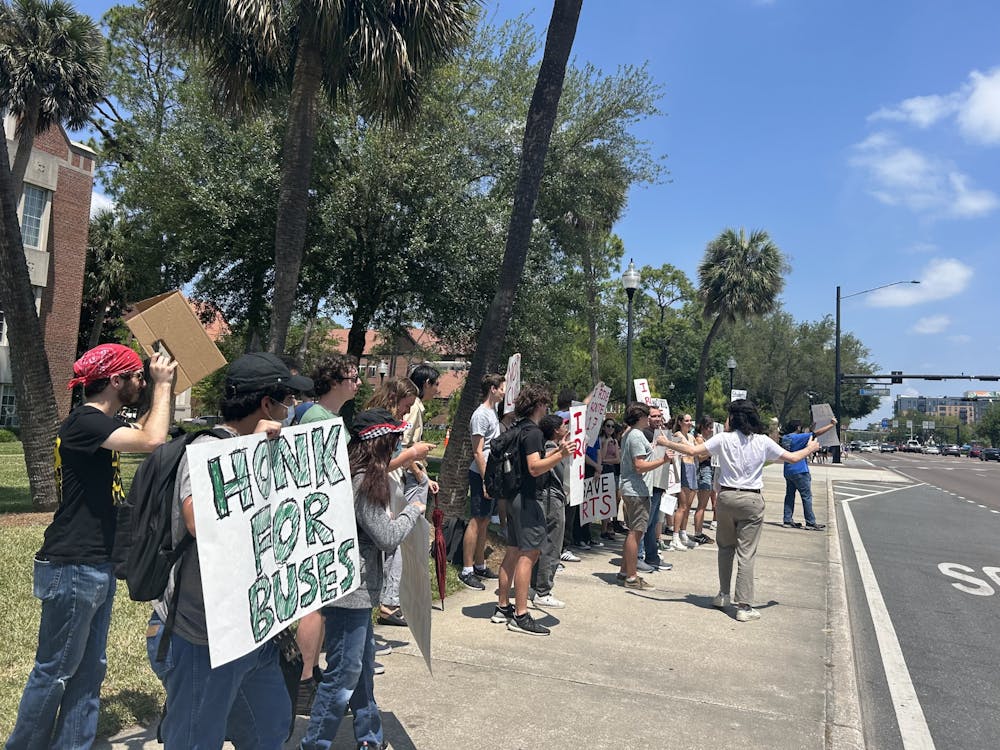CORRECTION: The Alligator incorrectly reported the year the Gainesville Regional Transit System was introduced. The article has been updated to reflect the correct year.
Gainesville faced the potential loss of a key community service following UF’s announcement April 9 to partially pull its fiscal contribution to the Gainesville Regional Transit System.
After over a month of student protests and community criticism, UF and the city came to an agreement at a City Hall meeting May 1 allowing RTS to continue providing its current level of service until Jan. 1, 2025. The compromise extended existing bus routes and schedules for six months beyond the June 30 contract deadline in anticipation of a permanent funding solution.
During a City Hall appearance May 10, Gainesville City Commissioner At-Large Cynthia Chestnut said she was “very pleased” to work with the extended time frame, and the city is prepared to arrange an agreement with UF by 2025.
The compromise follows widespread student and community disapproval. A protest organized by the Amalgamated Transportation Union Gainesville chapter took place outside Tigert Hall April 26, gathering a crowd of over 50 students and community members aiming to prevent RTS funding cuts. Additionally, one petition was circulated on change.org, accumulating over 900 signatures from “concerned gators.”
“The city public transit service supports a population of more than 200,000 residents. If we do not reach an agreement, and routes are impacted, it could alter the ability of RTS to serve the community for years to come,” said City Manager Cynthia Curry in an April 22 city press release.
Curry and UF Senior Vice President Dave Kratzer will remain in correspondence as the issue progresses, according to a May 1 UF news release.
Mayor Harvey Ward expressed concern about displaced RTS employees if they were to lose their jobs, highlighting the need for a permanent resolution.
“Everyone in this discussion is part of the same community. UF staff, students and faculty are part of Gainesville. So are the people whose jobs and business rely on the university,” Ward said in an April 9 city press release.
The RTS program, introduced in 1974, relies on UF for partial funding. Contributing nearly half of its annual revenue for the 2024 fiscal year, the university currently pays $14 million of the $28.5 million RTS accumulates annually, according to the city. If UF were to decrease its financial contribution, Gainesville would let go of 52 or more employees and shut down 11 of the 39 current bus routes, including all five campus routes, according to an April 11 city meeting presented by Curry .
“For people who take the bus to work or class — or the doctor or grocery store — that’s a major life change,” said Gainesvile Transportation Director Jesus Gomez in an April 9 city press release.
Both UF and Gainesville agree on the importance of sustained access to bus service across the Gainesville urbanized area during continued negotiation, according to their respective May 1 press releases.
Despite the temporary compromise, the lack of a permanent resolution weighed on students who rely on the RTS system.
Tuline Al Hassan, a 19-year-old UF biology rising sophomore, said she spent much of the Spring 2024 semester studying in the Marston Science Library. Next semester, she plans to live in Lakeside Residential Complex, a dorm 1.7 miles away from Marston.
“Access to the bus system is crucial for me, particularly when I'm living in Lakeside,” Al Hassan said. “Without it, getting to my classes would be incredibly challenging.”
As students struggle to afford the added expense of car ownership, she said buses play a vital role in their daily lives.
“They're not just a convenience,” she said. “They're a lifeline and one of the aspects of UF that I value most.”
If a permanent compromise is not made, all bus routes to Lakeside Residential Complex will be eliminated.
Nathaniel Pelton, a 20-year-old UF political science rising junior and off-campus student senator, currently serves as a chair member of the UF Senate Transportation Caucus, an organization he founded.
“I am proud of our city officials and the University of Florida for extending their commitment to providing the lifeline of public transportation at full capacity for six more months,” Pelton said.
However, he said it's essential for the community to not only remain aware of the issue but also actively participate in continued advocacy.
“We need your voice to advocate for the university to continue funding RTS,” he said. “The opportunity for any student to hop onto a bus and get to class, work and shop for groceries from anywhere in Gainesville is priceless.”
While a permanent solution hasn’t been decided, Gainesville and UF plan to meet monthly to discuss funding, Chestnut said during the city hall press conference.
Contact Morgan Vanderlaan at morganvanderlaan@ufl.edu. Follow her on X @morgvande.
Morgan Vanderlaan is a second year political science major and a Spring 2025 metro general assignment reporter. She has previously worked on the enterprise desk as a political reporter and on the county and city commission beat. When she's not on the clock she can be found writing, reciting and watching theatre!






